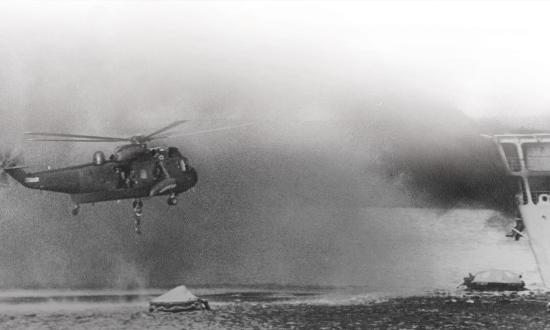Captain Don Walsh, U.S. Navy (Retired)
Create a sabbatical program giving midshipmen or junior officers a six-to-eight-month seagoing experience with other services or the U.S. Merchant Marine. For officers, two opportunities should be available—once as a junior officer and later as a more senior officer. By its diversity, the program would enhance career officers’ understanding of sea power.
Lieutenant Kyle Cregge, U.S. Navy
Double the obligated service requirement for Naval Academy graduates from five to ten years. Serving a full decade following commissioning would further reimburse taxpayers for the value of the education and tie those officers to the service to help with broader retention issues.
Major General William D. R. Waff, U.S. Army (Retired)
Considering the few commissioning sources available to the Coast Guard when compared with the other services, assign a Coast Guard junior officer to the Navy ROTC detachment at the six senior military colleges (The Citadel, Virginia Tech, VMI, Texas A&M, North Georgia, and Norwich) to expand the exposure to midshipmen of the potential to be commissioned as a Coast Guard officer.
Commander Gerry K. Hannon, U.S. Navy Reserve (Retired)
Only U.S. Naval Academy midshipmen train on yard patrol craft, but this was once also done at Officer Candidate School (OCS) with the Academy’s older and surplus yard patrol craft. That invaluable early introduction to shipboard watchstanding and integration, a practical foundation for learning good shiphandling, should be returned to OCS.
Lieutenant Commander Brian Hayes, U.S. Navy Reserve (Retired)
Restrict the Navy Reserve’s direct commission program to Staff Corps specialties. Currently, a civilian can obtain a commission as a restricted line officer without attending Officer Candidate School or any other type of in-person training or education. The process is too easy, which is why it attracts so many aspiring politicians.
Commander Ed Griffith, U.S. Navy Reserve (Retired)
“If it ain’t broke, don’t fix it” is wisdom that applies to more than just naval uniforms. Having three primary commissioning programs has served the Navy well. The Naval Academy, ROTC, and OCS produce officers with different points of view. OCS can expand or contract depending on changing needs. This is not a problem. As with uniforms, the cure would likely be worse than any imagined problem.
Midshipman Wesley Brewer, Maine Maritime Academy
Hands-on training is the biggest need for new officers. The Navy’s new student indoctrination is a good beginning to improve this, but more is needed to allow midshipmen to practice leadership and learn from their mistakes before they hit the fleet. Practical experience is critical to learn and grow.
Colonel William J. Glasser, Judge Advocate, U.S. Army (Retired), U.S. Navy Veteran
Require at least two years honorable active-duty enlisted service to exhibit attitude and aptitude before entering commissioning programs. Great leaders must first be good followers and those who cannot hack it must be screened out before costly investments of time and money.
Blaine Worthington, U.S. Marine Corps Veteran
Include project management training in all commissioning programs. Every officer will be tasked with managing projects of all sizes from their first day in the fleet. A standard framework (such as project management program certification) would be useful for new officers.
Commander David L. Rupp, U.S. Navy Reserve (Retired)
Emphasize more education and training in shiphandling and antisubmarine warfare. There are many demands on students, but we cannot afford to get behind or even stay even with our enemies.







